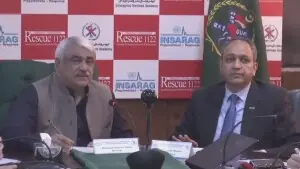More pain than relief for KP health card holders
7 min readPESHAWAR: 48-year-old Gul Bibi travelled three hours from her hometown in Bajaur to the Muhammad Teaching Hospital in Peshawar for surgery. She was able to afford the treatment because of the health insurance provided under the Sehat Sahulat programme. But the hospital turned her away saying her computerized national identity card (CNIC) had not been registered in the programme.
“If the facility of treatment is being given on the basis of national identity card, then why are there so many complications,” asked the woman as she prepared for the return journey.
Irfan, a 29-year-old from Peshawar, shared a similar story from two months ago.
“When I went to the Rehman Medical Institute for my mother’s treatment, I was told that all the beds allotted under the programme were occupied,” he said. The hospital offered to admit Irfan’s mother as a private patient instead of under the health card scheme.
43-year-old Shabnam Bibi from Peshawar was able to get the surgery, which was done free of cost under the programme. But the hospital did not provide the medicines she had to use after the surgery. Under the programme, the hospitals are required to provided medicine for five days to the patient. Shabnam Bibi had to buy the medicines herself.
Thousands of others have faced problems that were similar in nature.
Complaints piling up
Data from State Life Insurance, which is implementing the programme, shows 2,604 complaints filed by patients and doctors against various hospitals this year.
The highest number of complaints were about the Lady Reading Hospital, the largest public sector hospital in Peshawar.
Here is a breakdown of complaints against each hospital:
- Lady Reading Hospital - 393
- Khyber Teaching Hospital - 366
- Institute of Radiotherapy and Nuclear Medicine - 170
- Institute of Kidney Diseases - 130
- Rahman Medical Institute - 129
Here is the city-wide breakdown of complaints:
- Peshawar - 1,587
- Mardan - 372
- Swat - 203
- Malakand - 105
Meanwhile, a joint team of the Sehat Sahulat Programme and the insurance company conducted a clinical audit in August this year. It identified 30 hospitals where treatment and facilities were not up to the mark. The team recommended terminating the contract with these hospitals and replacing it with new hospitals, but these recommendations have not been implemented yet.
Auditing Sehat Card Plus
Baker Tilly Pakistan was engaged for a performance audit of the ‘Sehat Card Plus’ facility for the period November 2020 to June 2021. It’s report revealed that the beneficiaries of the programme had no idea about the existence of a complaint system. Despite that, the insurance company received 1,881 complaints through its helpline
The audit report stated the health card does not include diagnostic tests for many diseases. This means patients have to get tests done from private laboratories and pay it out of their pocket. The report noted there was no mechanism in place to compensate patients for these expenses.
The study also identified shortage of nursing staff, absence of operation theaters, lack of informational material and unverified documentation of medical staff in many hospitals.
Dr Asfandyar Bhittani, the president of the Young Doctors Association, Khyber Pakhtunkhwa, alleged that sub-standard medical facilities are being provided under the programme.
“The market price of standard eye lenses is currently Rs25,000. Under the health card, its price is Rs20,000. This clearly shows that substandard lens are being provided to patients.”
Dr Bhittani said that sub-standard medicines wasn’t the only problem. “Several sub-standard hospitals have been included in the list of hospitals where treatment is provided under the health card.”
He also spoke about payment delays, saying some hospitals and doctors were facing payment delays of five to eight months. “Nothing has been done to resolve the issue of arrears.”
Baker Tilly’s audit confirmed that 34 percent of hospitals or health centres were not satisfied with payments, with 94% of hospitals recommending an e-claims processing system to facilitate payment.
The audit noted that Rehman Medical Institute (RMI) was the only hospital allowed to make partial bed allocation for Sehat Card Plus patients. Baker Tilly’s report termed it “preferential treatment” saying there was a risk that other listed hospitals could also resort to such a practice. This could lead to increase in denial of treatment cases on account of lack of available beds, it added.
Stakeholders’ response
The State Life Insurance management acknowledged the problem and stated that it had taken up the matter with RMI. If the hospital does not agree to end partial bed allocation, then it might be removed from the programme.
The insurance company received the most complaints against the Lady Reading Hospital (LRH). LRH spokesperson Muhammad Asim told Aaj Digital that a committee has been formed and most of the complaints of patients have been resolved.
He added that despite the complaints, LRH had about 1,000 patients under the health card. “It is the maximum number of patients under the health card at any hospital,” he said.
Sehat Sahulat Card programme Deputy Director Dr Waheed said that the delay in payments to hospital is due to submission of incomplete documents by those hospitals. “We try to ensure timely payment to all hospitals.”
Dr Riaz Tanoli, the CEO of the programme, acknowldged the ‘teething’ problems in the programme before adding that free health facilities was a blessing for a developing country.
When asked about the complaints, Dr Tanoli said that all of them were investigated. If the hospital is found guilty, the first time they are warned. On the second complaint, the hospital is suspended. If there is a third strike, the hospital’s contract with the Sehat Sahulat programme is terminated.“
Dr Tanoli said that 13 hospitals were removed from programme last year following another clinial audit on the complaints of patients. “We have decided to fine hospitals as well over complaints. We have recommeded the same to the health department. A summary will be prepared and approved by the provincial cabinet soon.”
Dr Tanoli said hospitals would undergo annual reviews in January, in which the decision would be taken whether to retain the hospital on the Sehat Card panel or to add a different one.
When complaints like the one made by Bajaur’s Gul Bibi was shared with Dr Tanoli, he said that while the service is provided on the basis of the CNIC, the patient must be a resident of Khyber Pakhtunkhwa to avail it.
The KP government had been tasked with managing health cards of residents of the tribal areas but the process has been marred by delays. This could be the reason why Gul Bibi was turned back.
Dr Tanoli added that the individual seeking treatment must also be part of the family tree of the health card beneficiary, as per Nadra records.
The project CEO was also dismissive of allegations that sub-standard medicines were being provided to patients, saying they were approved by the Drug Regulatory Authority of Pakistan (Drap), the country’s drug regulator.
“If the drugs were not approved by DRAP, why are they prescribed by doctors and why are they available in the market?”
What’s included and what isn’t
A document of the provincial health department shows that there are 1,043 hospitals across the country on the panel of the Sehat Sahulat Programme. Of those, 191 hospitals are in KP with residents of the province only able to avail the health card facilities at these hospitals.
It states that free of cost treatment is being provided to more than 9.6 million families under the programme. Each family can get free of cost treatment up to Rs1 million per year. On average, Rs62,000 is spent per patient. From 2015 till date, Rs39 billion have been spent on the programme.
Here is what is covered under the programme:
- Heart diseases
- Diabetes mellitus complications
- Burns and accidents
- Dialysis
- Chronic diseases necessitating admissions including tuberculosis, Hepatitis B and C, chronic liver disease, HIV and rheumatology
- Organ failure management
- Cancer management including chemotherapy, radiotherapy & surgery
- Neuro-surgical procedures
According to State Life Insurance, the following are not included for treatment under the programme:
- Out-patient department
- Intentional self-inflicted injuries
- Injuries resulting from unlawful act
- Injuries due to war situation / military action
- Sports injuries
- Nuclear installation related injuries
- Cosmetic surgery
- Hair transplant
- Infertility
- AIDS
- Blood screening and matching
- Sexual, psychological, mental, neurobiological and dental diseases
Treatment required in case of natural disasters like floods, earthquakes, typhoons, etc. are also not a part of the program.
Dr Tanoli said that the KP government passed the Khyber Pakhtunkhwa Universal Health Coverage Act 2022 this year to give legal status to the Sehat Sahulat Programme.
He said that the health card facility will be exapnded over the years, with treatment of more diseases to be included under it.
For the latest news, follow us on Twitter @Aaj_Urdu. We are also on Facebook, Instagram and YouTube.

























Comments are closed on this story.